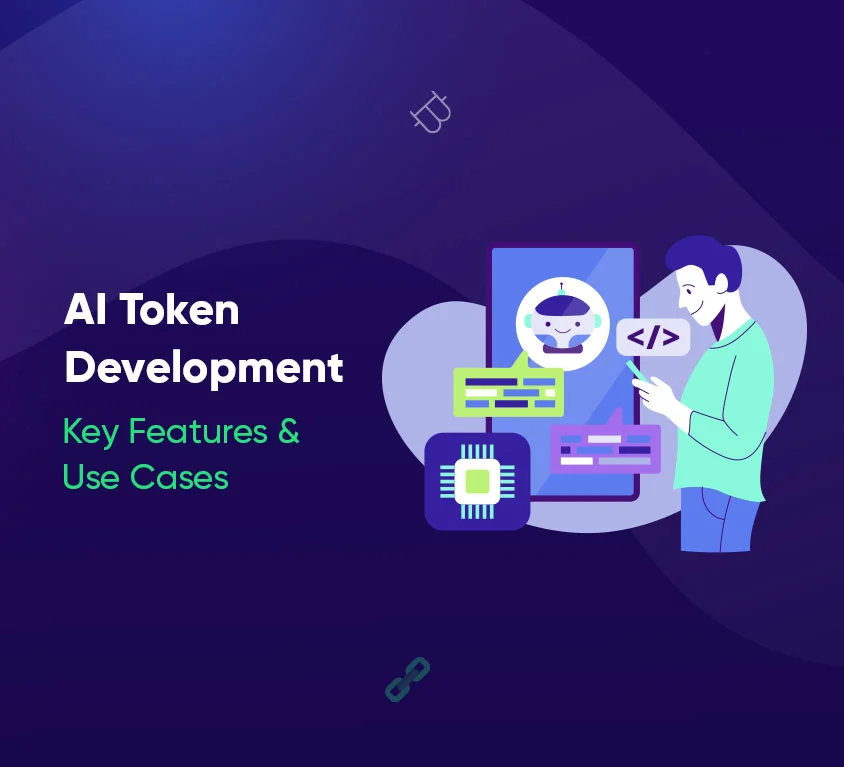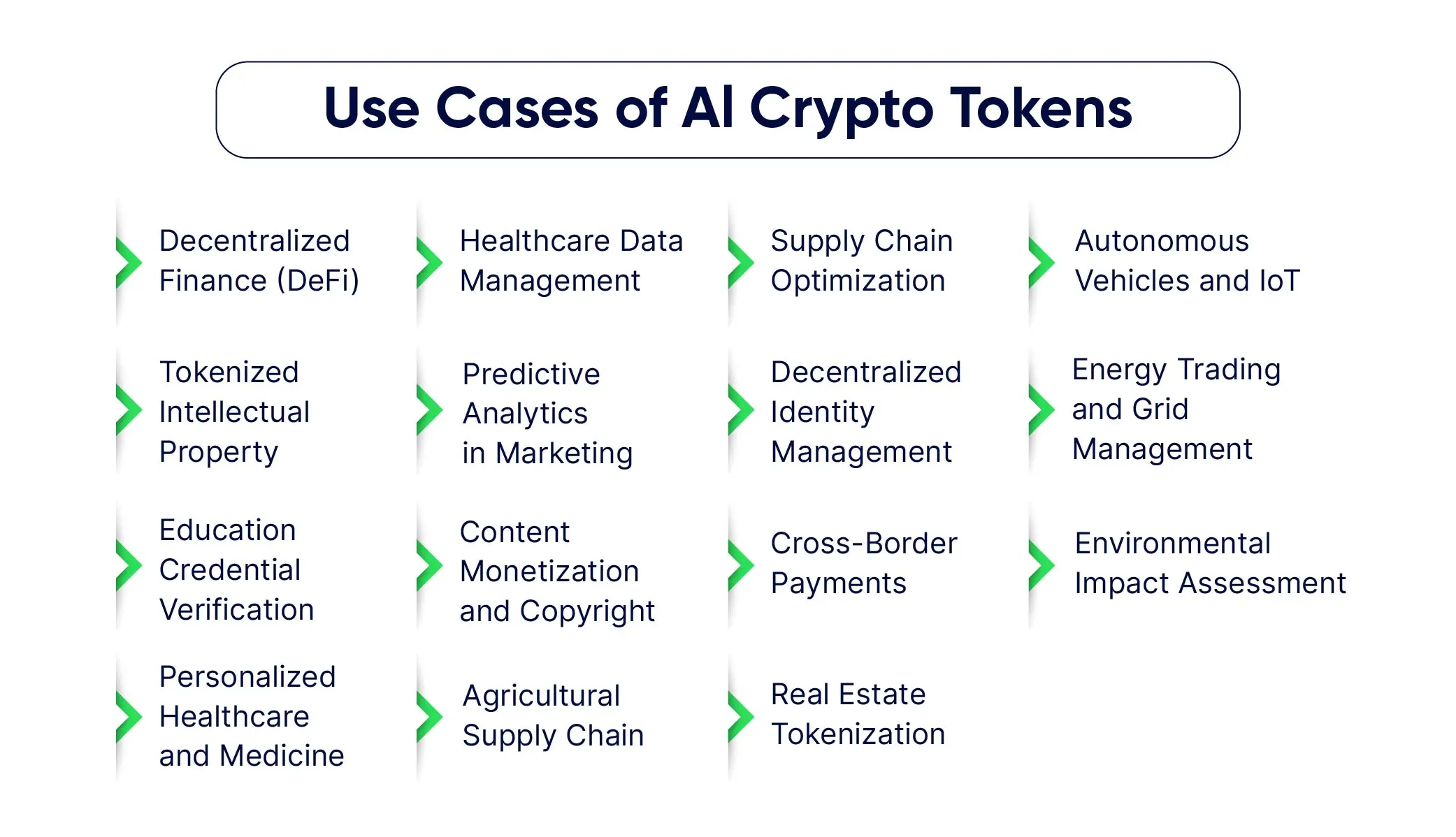
Introduction
Blockchain & Web3 Services Trusted By Leaders
- Develop innovative solutions using our state-of-the-art blockchain expertise.
- Achieve accelerated growth with robust & scalable Web3 consulting.
- Unlock 360-degree security with our top-rated blockchain development.
AI Token Development: Key Features & Use Cases
Artificial Intelligence short for AI is the game-changer in the technology industry. In addition, Blockchain technology and AI combination can create something truly amazing like; powerful new entities known as AI Crypto Tokens. These tokens are powered by state-of-the-art machine learning algorithms that are interwoven with the sturdy framework of blockchain technology. They may be the architects of a new era that will allow for more opportunities to develop decentralized apps. In this guide, we will learn What is AI Token Development, its key features, use cases, and involved blockchain platforms or protocols. Let’s explore the fusion between AI and blockchain, and understand why these developments are shaping the future of decentralized applications.What is an AI Token?
What is AI Token Development?
The development of AI tokens is significant as a novel combination of blockchain technology and artificial intelligence (AI), offering several benefits in the ever-evolving field of technology. This novel approach provides tokens the ability to perform complex tasks autonomously and adaptably by endowing them with intelligent algorithms in addition to predefined actions. The potential for AI token development to improve functionality, establish decentralized intelligence, introduce intelligent automation, and enable adaptive learning makes it noteworthy.Features of Al Token Development
AI token development is characterized by unique features enhancing its effectiveness across various applications. Let’s learn the key attributes that make AI tokens distinctive and powerful:- Smart Contract Integration: AI tokens leverage smart contracts, automating processes and executing predefined functions without intermediaries.
- Adaptive Learning Capabilities: AI tokens possess the ability to learn and adapt over time through machine learning algorithms, enhancing their intelligence and efficiency.
- Decentralization: Operating on decentralized blockchain networks ensures transparency, security, and resilience, mitigating single points of failure.
- Privacy and Security: Robust security measures and privacy features protect sensitive data, employing cryptographic techniques for secure transactions.
- Interoperability: Designed to be interoperable, AI tokens seamlessly interact with other tokens, smart contracts, and decentralized applications within the blockchain ecosystem.
- Token Standardization: Adherence to established token standards ensures compatibility with existing infrastructure, wallets, and exchanges.
- Governance Mechanisms: The incorporation of governance mechanisms empowers token holders in decision-making processes, fostering decentralized governance.
- Scalability: Crucial for accommodating potential user base growth and transaction volume without compromising speed or increasing costs.
- Cross-Chain Compatibility: Some AI tokens aim for cross-chain compatibility, operating on multiple blockchain networks for increased adoption and functionality.
- AI-Driven Oracles: Utilization of AI-driven oracles provides real-world data for decision-making, enhancing interaction with real-world events.
- Energy Efficiency: Prioritizing energy-efficient consensus mechanisms ensures minimal environmental impact while maintaining network security.
- Cross-Platform Compatibility: Designed to operate seamlessly across platforms, including desktop applications, mobile devices, and web interfaces, enhancing accessibility and user engagement.
Use Cases of Al Crypto Tokens
AI crypto tokens find applications across various industries that are bringing innovation and efficiency to different domains. Let’s explore the diverse use cases of AI crypto tokens:
- Decentralized Finance (DeFi): AI tokens play a crucial role in decentralized finance, automating tasks such as smart contract execution, risk assessment, and algorithmic trading.
- Healthcare Data Management: Enhancing security and interoperability, AI tokens in healthcare manage and secure sensitive patient data, ensuring efficient and privacy-centric data sharing.
- Supply Chain Optimization: Optimizing supply chain processes, AI tokens enhance transparency, traceability, and efficiency in tracking goods, preventing fraud and reducing inefficiencies.
- Predictive Analytics in Marketing: AI-powered tokens analyze vast datasets to provide predictive analytics in marketing, aiding businesses in understanding customer behavior and optimizing marketing strategies.
- Tokenized Intellectual Property: AI tokens facilitate the creation and management of tokenized intellectual property, enabling transparent ownership, licensing, and royalty distribution.
- Autonomous Vehicles and IoT: In the realm of autonomous vehicles and the Internet of Things (IoT), AI tokens contribute to secure and decentralized communication, enabling efficient data exchange and decision-making.
- Decentralized Identity Management: AI crypto tokens enhance identity management by providing decentralized, secure, and privacy-centric solutions, reducing the risk of identity theft.
- Energy Trading and Grid Management: AI tokens optimize energy trading by predicting demand, managing grid stability, and facilitating peer-to-peer energy transactions within decentralized energy networks.
- Education Credential Verification: Revolutionizing credential verification, AI tokens ensure the authenticity of educational credentials, reducing the risk of fraudulent claims.
- Content Monetization and Copyright: AI-powered tokens enable fair content monetization and copyright management by automating royalty distribution and ensuring compliance with intellectual property rights.
- Cross-Border Payments: Facilitating cross-border payments, AI tokens streamline transactions, reduce fees, and enhance security, transforming traditional payment systems.
- Environmental Impact Assessment: AI tokens contribute to an environmental impact assessment by analyzing data to measure and mitigate the ecological footprint of businesses and projects.
- Personalized Healthcare and Medicine: In the healthcare sector, AI tokens contribute to personalized medicine by analyzing patient data to tailor treatment plans and predict potential health issues.
- Agricultural Supply Chain: Optimizing the agricultural supply chain, AI tokens improve crop management, logistics, and quality control, ensuring efficiency and reducing waste
- Real Estate Tokenization: Revolutionizing real estate, AI tokens facilitate the tokenization of properties, allowing for fractional ownership, efficient transactions, and increased liquidity.
Various Blockchain Protocols Used in Al Token Development
AI token development relies on diverse blockchain protocols that provide the foundation for creating and managing these intelligent digital assets. Explore the various blockchain protocols commonly used in AI token development:
1. Ethereum
Ethereum is a pioneering blockchain platform that introduced smart contracts, enabling the creation of decentralized applications (DApps). It has a large and active developer community. Ethereum is widely used for AI token development, thanks to its well-established ecosystem and the ERC-721 and ERC-20 token standards, which facilitate token creation.
2. Binance Smart Chain (BSC)
Binance Smart Chain, developed by the popular cryptocurrency exchange Binance, is known for its high throughput and low transaction fees. It operates in parallel with Binance Chain and supports smart contracts. BSC is chosen for AI token development due to its efficiency, cost-effectiveness, and compatibility with the broader Binance ecosystem.
3. Solana (SOL)
Solana is recognized for its high-performance blockchain, capable of handling a large number of transactions with low latency. It aims to provide scalability without compromising decentralization. Solana’s speed and scalability make it an attractive choice for AI token development, especially for applications that require rapid transaction processing.
4. Tron (TRX)
Tron focuses on high throughput and low fees, making it suitable for decentralized applications. It aims to create a decentralized internet by providing a platform for content sharing and creation. Tron’s efficiency in transaction processing and low costs make it a viable blockchain for AI token development, especially in use cases where cost-effectiveness is crucial.
5. Polkadot (DOT)
Polkadot facilitates interoperability between different blockchains, allowing AI tokens to connect and share information seamlessly. Its relay chain and parachain architecture contribute to scalability and customization.
6. Cardano (ADA)
Cardano, known for its emphasis on security and scalability, provides a reliable foundation for AI token development. Its unique consensus algorithm, Ouroboros, ensures efficient and secure transactions.
7. Tezos (XTZ)
Tezos, a self-amending blockchain, is chosen for AI token projects requiring on-chain governance. Its ability to evolve through protocol upgrades without hard forks contributes to flexibility and adaptability.
8. Avalanche (AVAX)
Avalanche offers a highly scalable and customizable platform for AI token development. Its subnets and interoperability features make it suitable for projects requiring high throughput and decentralized applications.
9. NEO (NEO)
NEO, often referred to as the “Ethereum of China,” provides a platform for deploying smart contracts and tokens. Its focus on digitizing assets and digital identity aligns with use cases requiring AI and blockchain integration.
10. Algorand (ALGO)
Algorand’s blockchain protocol prioritizes speed, scalability, and security. AI token development on Algorand benefits from its fast confirmation times, low transaction costs, and efficient consensus algorithm.
11. Harmony (ONE)
Harmony’s sharding technology enhances scalability, making it suitable for AI token projects requiring high throughput and low latency. Its consensus algorithm, Effective Proof of Stake (EPoS), ensures energy efficiency.
12. Cosmos (ATOM)
Cosmos focuses on interoperability between blockchains, enabling AI tokens to communicate seamlessly with other blockchain networks. Its hub-and-zone model supports a variety of use cases.
13. Filecoin (FIL)
Filecoin, known for its decentralized storage capabilities, is utilized in AI token projects requiring secure and distributed storage solutions. It ensures data integrity and accessibility.
What are Al Token Development Services?
AI token development services help businesses and projects understand the potential of artificial intelligence in decentralized ecosystems. They create secure smart contracts, integrate AI algorithms, create tokenomics models, conduct security audits, integrate AI tokens into decentralized applications, establish democratic governance mechanisms, and ensure seamless operation across platforms. They also implement scalable solutions, enhance interoperability, integrate AI-driven oracles, and provide expert consultation throughout the development lifecycle. These services contribute to the creation of intelligent, decentralized ecosystems, leveraging the synergies between AI and blockchain technologies.Why choose BloxBytes for Al Token Development?
BloxBytes stands out as a premier choice for AI token development, offering a unique blend of expertise, innovation, and commitment to client success. Here are compelling reasons to choose BloxBytes for AI token development:- Diverse Expertise: BloxBytes brings a wealth of experience in diverse areas, including DeFi, MetaFi, GameFi, token development, and comprehensive blockchain development services.
- Innovation in Solutions: Known for fostering innovation, BloxBytes goes beyond conventional approaches, introducing cutting-edge solutions that align with the latest advancements in AI and blockchain technologies.
- Holistic Blockchain Services: Beyond AI token development, BloxBytes provides a wide spectrum of blockchain services, ensuring a holistic approach to decentralized solutions across industries.
- Client-Centric Approach: BloxBytes prioritizes client satisfaction, tailoring AI token development services to meet specific business requirements and objectives.
- Proven Track Record: With a track record of successful projects, BloxBytes demonstrates a history of delivering high-quality solutions that meet or exceed client expectations.
- Scalable and Efficient Solutions: BloxBytes focuses on scalability and efficiency, ensuring that AI tokens are developed to meet the demands of growing user bases and transaction volumes.
- Strategic Consultation: Clients benefit from BloxBytes’ strategic consultation, gaining insights into optimal tokenomics, governance models, and integration strategies.
- Transparent Processes: BloxBytes maintains transparency throughout the development process, providing clients with clear communication, progress updates, and adherence to project timelines.
- Security and Compliance: Security is a top priority for BloxBytes, with rigorous security audits and compliance measures in place to safeguard AI token implementations.
- Flexible Engagement Models: BloxBytes offers flexible engagement models to accommodate various project sizes, ensuring that businesses of all scales can leverage their expertise.